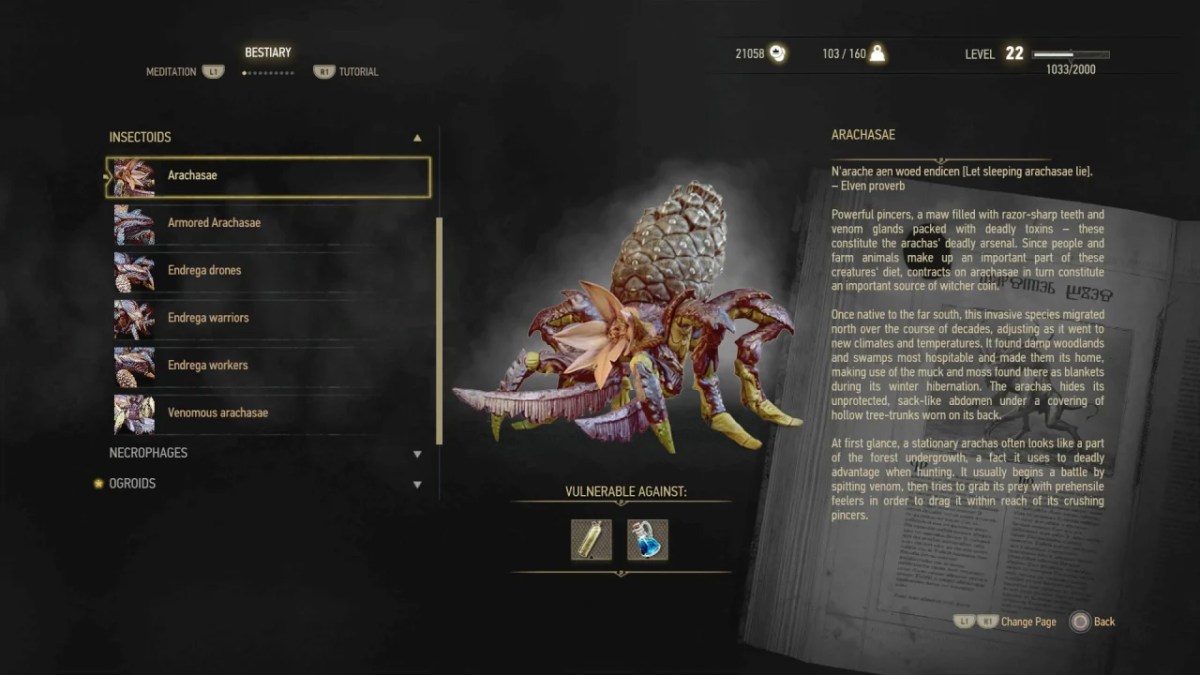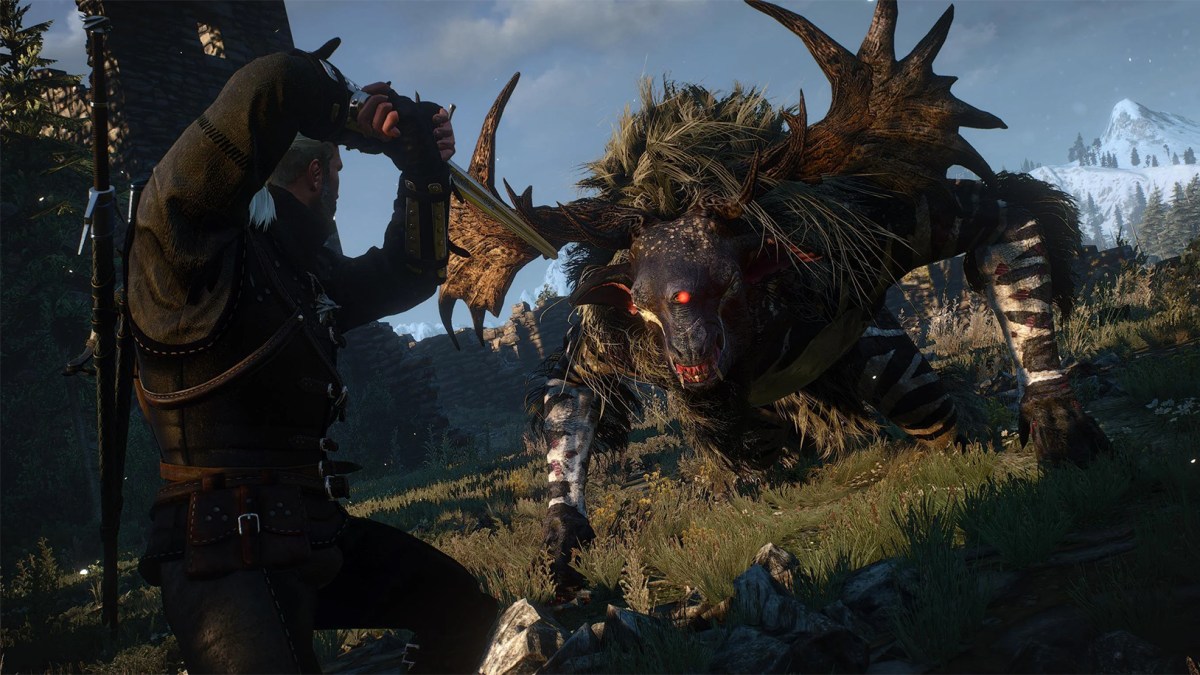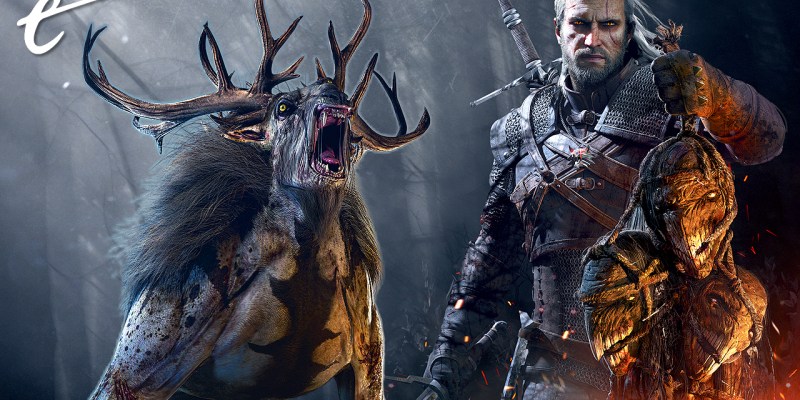The template of a “kill contract” mission is well-trodden in open-world games. It can represent either a thrilling and exciting detour in a story you loved or just some annoying busywork used to inflate the game’s playtime on HowLongToBeat. Some shining examples of the former are the witcher contracts in The Witcher 3. In these monster-hunting missions, you’ll explore narratives that feel like interactive Grimm’s Fairy Tales with fun investigative elements and carry out the witcher’s reviled but necessary role in this fantasy world against more and more fearsome monsters.
Even as you gain power, the steps of bartering for your deserved price, learning about the monster through interviews and examining the wounds of its victims, and eventually entering its lair or finding a way to summon it always made me feel nervous for the fight ahead. And honestly, the monster design in the game usually met those expectations. I remembered the first time I encountered monsters like the venomous spider-like Arachas or the towering Fiend and wondered how I’d be able to take them down.
Law & Order and the best of crime TV truly have nothing on Geralt of Rivia. These missions are a far cry from just selecting an assassination target on a menu and following the waypoint. You usually have to talk to an aggrieved relative or friend to try to find someone missing who, more often than not, is not coming back home safe. The disdain that most people in the world carry for your profession also bleeds into the dialogue, with even well-meaning townspeople usually having some hostility or shame around needing a witcher in the first place.

There’s something to be said about the ways these contracts are repetitive compared to other types of kill sidequests in open-world games. I think back to the kill missions that would show up when you clear an enemy base in Far Cry 3. They would usually lead to some fun arenas that test your skills in combat, but you’d always have to kill the main target with a knife. I always felt baffled that they used that same wrinkle in every challenge instead of changing it up. In The Witcher 3, you know that you’ll likely be doing some investigating and maybe sniffing around for clues in Witcher Sense mode, but the massive bestiary and larger variety of landscapes and monster territories lend themselves naturally to greater nuance in the quests themselves.
The game’s deep RPG systems and combat options also make the witcher contracts an excellent testing ground for your new weapons, combat skills, or alchemical creations. And as a player who has focused on alchemy, with potions, blade poisons, and a frankly irresponsible number of cool bombs at the ready, I also get an extra motivation to seek out more contracts. Finding new monsters to kill could grant me a special new decoction, potions made from monster parts, that adds even more interesting wrinkles to fight. Even those invested in other skills will get trophies from their victims that provide minor buffs, and there is usually plenty of treasure to discover on the way to the monster fight.
I also enjoy that the world of The Witcher 3 is brutal and unforgiving, but with the lenient save system, you can also nope out of any mission encounter without any punishment and then retry it later when you have more gadgets and power built up. This mentality later let tons of new fans flock to the Soulslikes in Elden Ring, where you double back and uncover tons of secrets and new areas if you could not beat a certain boss. The Witcher 3 is just big enough to always have somewhere you can explore more deeply, but it also has enough granular detail in all those systems to make you feel like it’s worth doing whatever you come across.

I’ve absolutely been engaged in Geralt’s primary story and the looming threat of the Wild Hunt, but to be honest, I’m putting off a pretty climactic fight in the story right now just to clean up on more contracts, even ones that are over 10 levels above my level right now. (Don’t be too impressed; I’m playing on Normal.) Sidequests are too often shoehorned into open-world games nowadays, but the best of the best know that they are opportunities for stories just as impactful as the main path.
The quests in The Witcher 3 show that there can be a fine line between comfortable familiarity and dull repetitiveness. In other games, even some of my very favorites like Skyrim, I began dreading having to track down unnamed bandit chiefs and other hooligans and quickly tired of checking in on town bounties and the generic sidequests offered by the different guilds.
But the repeating elements in The Witcher 3 were things I looked forward to: dialogue interactions where we hear paranoid ramblings about close calls with the monster or other details, exploring segments of the map you may have breezed by on other missions, and some genuinely good self-contained stories. Even as this game continues to age, it still feels remarkably fresh when compared to the average open-world game that gets released these days because of how much engaging material is brimming below the surface.
